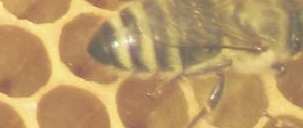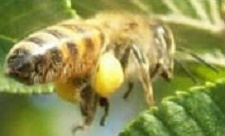
Pollen from flowers of many grasses, trees and other plants can cause
allergies in many people, Bee pollen contains vitamins, minerals, carbohydrates,
lipids, and protein. But that same pollen, collected by honey bees, is believed
to help allergy sufferers! You will see thousands (literally) of websites promoting raw, local honey or bee
pollen supplements as a miracle treatment for allergies, low energy, sleep
problems, improving longevity, it's a superfood... the list is endless.
You will see thousands (literally) of websites promoting raw, local honey or bee
pollen supplements as a miracle treatment for allergies, low energy, sleep
problems, improving longevity, it's a superfood... the list is endless.
Pollen is collected by worker bees on the pollen baskets on their hind legs as they visit flowers. When the bee visits a flower, it stuffs pollen with some bee saliva, into the pollen baskets, the tiny hairs on the back of their hind legs making the yellow granules you see in the photo. As the honey bees travel from flower to flower collecting nectar, they collect hundreds, sometimes millions, of pollen grains from a single flower. It is these pollen ganules that become the bee pollen we're discussing now.
So, Bee Pollen contains local pollen, can it help with allergies?
For a website like ours that helps consumers find local; honey it would be great if it did. But we're not going exaggerate or lie for profit to you like so many in the honey business and supplement industry do. A review of recent credible research and credible sources (see references below) in unanimous: there is no credible scientific research that shows that bee pollen is effective for allergies.
The University of Rochester says:
There are no well-established uses for bee pollen. Although many claims are made for pollen, there are no solid studies that support these claims. ... Most of the claims made for bee pollen are unsubstantiated. Many healthcare providers feel that the benefits of using bee pollen don’t outweigh its risks.
However, people use bee pollen for many reasons. These can include helping symptoms of benign prostatic hyperplasia and inflammation of the prostate (chronic prostatitis). It’s also used to ease allergies and protect the liver from effects of some toxins. Bee pollen is also claimed to lower cholesterol, reduce hardening of the arteries (atherosclerosis), improve metabolism, and increase hormone levels. It may also improve stamina and sexual strength, reduce depression, and ease bleeding problems.
WedMD says:
You may also hear recommendations for using bee pollen for alcoholism, asthma, allergies, health maintenance, or stomach problems, but there is no proof that it helps with these conditions. Before you take any natural product for a health condition, check with your doctor.
A group of doctors and researchers in the Journal of Dietary Supplements; conducted an "Evidence-Based Systematic Review of Bee Pollen" and concluded
Typically, bee pollen is used as a rejuvenator or a tonic. It is also used to enhance athletic stamina and strength and to assist in recovery from illness. Bee pollen is often used as a pollen and spore antidote during allergy season. It may aid in respiratory complaints such as bronchitis, sinus congestion, and common rhinitis. In the support of hormonal disorders, bee pollen is thought to balance the endocrine system with specific benefits in menstrual and prostate disorders. In Chinese medicine bee pollen is used for blood formation, reducing cravings for sweets and alcohol, as a radiation protectant, and a cancer inhibitor. Available research does not adequately support its use for these indications.
Is there any harm in taking bee pollen supplements?
Most people can eat bee pollen with no ill effects, But for those with allergies, bee pollen can cause shortness of breath, hives, swelling, and anaphylaxis - a typical allergic reaction.
The first couple of times he took bee pollen as an energy supplement, according to Pat Cummings, nothing much happened. What happened when he took it Monday, however, is more than the Dallas Mavericks' center had bargained for. He suffered an allergic reaction that, he was told, could have been fatal if the team's trainer, Doug Atkinson, hadn't rushed him to a hospital for an antidote.
The Canadian Medical Association Journal reports:
A 30-year-old woman with seasonal allergies but no history of allergies to food, drugs, insects or latex had an anaphylactic reaction after taking bee pollen. She had swelling of the eyelids, lips and throat, difficulty swallowing, hives and other life-threatening symptoms. After emergency treatment and discontinuation of the bee pollen supplements, there were no further reactions.
Fox News reports:
Experts are warning that taking natural bee pollen supplements may come with the risk of suffering a serious allergic reaction, including life-threatening anaphylactic shock.
What about eating raw, local honey for the pollen in it to treat allergies?
The amounts of pollen in honey is tiny. But, even if there were enough local pollen in honey or bee pollen supplements to make a difference, Slate.com points out: It is the wrong kind of pollen. Most allergies are caused by trees and grasses, not the flowers that bees visit to make honey. If you can find a pollen supplement made from the specific bloom to which you are allergic... maybe. But at present there's no credible research on that, and how would you know the product is really what it claims to be?
And the NY Times reports:
Eating that honey - just a spoonful a day - can build up immunity through gradual exposure to the local allergens that can make life so miserable for allergy sufferers. Or at least that’s the thinking behind it. But when University of Connecticut Health Center researchers did a test, they found that the honey had no such effect. ...
In the UC study:
One (group) consumed a tablespoonful daily of locally collected, unpasteurized and unfiltered honey; another ate commercial honey; and a third was given a corn syrup placebo with synthetic honey flavoring.
After tracking the subjects’ symptoms for months, the scientists found that neither of the honey groups saw improvements over the placebo group.
Of course, some apiaries are now claiming that the problem is that ultrafiltration removes pollen. This argument does not hold water.. since, as established already, even unfiltered honey contains little pollen, and it's the wrong type and there is no reason to believe that ingesting it (as contrasted with inhalation for example) actually has any effect on allergies.
Aren't their studies that support eating raw, local honey to treat allergies.
Quite simply, no. At least not if you mean credible studies. Allergies Partners does a good job of debunking this myth, saying
locally grown honey is not beneficial for allergies. How so? Obviously in the first article there was no benefit obtained in the group consuming locally grown honey but the same result was actually shown in the second study. If the honey was not doctored with additional birch pollen, symptom improvement DID NOT occur.
And in regard to other studies and claims on websites:
most of what's available is purely anecdotal with little factual evidence supporting the claim. Surprisingly, some websites purport the benefit but contradict their own anecdotal evidence.
Bee Pollen as a Superfood?
Nope. More marketing hype for superprofits for the sellers. According to the National Honey Board:(and if any organization would have a motivation to promote legitimate uses of honey, it would be them):
The amount of pollen in honey is minuscule and not enough to impact the nutrient value.
Hypothetically, bee pollen is an excellent source of nutrition. With its abundance of vitamins, minerals, amino acids, and enzymes, it is hard not to believe the many claims made about the positive effects of bee pollen. Although a very limited amount of recent information can be found proving positive nutritional effects, in reality, studies have consistently proven that bee pollen has no ergogenic effects. Furthermore, no legitimate information can be found proving positive effects on weight loss. In fact, one study (Xie, Wan & Li, 1994) shows that pollen can actually induce weight gain
Fox News:
Bee pollen is used to enhance energy, vitality, memory and performance, and sometimes even to reduce allergies, though there’s little evidence to support any of these uses. It’s considered a super food because it contains proteins and is rich in vitamins, minerals and phytochemicals. It comes from the pollen that collects on the bodies of bees.
Conclusion
Honey is a great, natural food and natural sweetener, with a lower GI and GL than table sugar. But, the hype of eating honey (including local, raw honey) to reduce allergies has been thoroughly discounted by many credible authorities on the subject, even including national beekeeping organizations.
The use of bee pollen supplements to treat or relieve allergies is also not substantiated by any scientific studies or research. Is it possible that not enough research has yet been done? Yes, that is possible. But not likely. Or the bee pollen on the market is too variable? Or that the placebo effect works?. Again, it's possible... just not very likely.
The University of Connecticut researchers summarizes the use of honey for the relief of allergies this way:
This study does not confirm the widely held belief that honey relieves the symptoms of allergic rhinoconjunctivitis.
AsScience-Based Medicine says:
What you never find on such websites are references to published peer-reviewed studies that substantiate the specific claims being made. There are also concerns about safety which have not been adequately studied....
Bee pollen products are a classic example of the current fallacies of the supplement industry. The claims made for such products are full of hype but are completely unsubstantiated by rigorous scientific evidence. What little evidence we do have shows that it is ineffective. What passes for “scientific” evidence on promotional websites are ancient tales and anecdotes. Further, there are increasing safety concerns about bee pollen products, mainly from the potential for allergic reactions but also including organ toxicity.
Moliere, the famous 17th-century French playwright wrote: "People can be induced to swallow anything, provided it is sufficiently seasoned with praise," And there are plenty of websites and beekeepers heaping praise on bee pollen... and making a profit from that.
If you believe that you have a source of credible research that I've overlooked,, please send me links to the source information, (In other words, a major, recognized university, NGO, etc... Hate mail from crackpots and obviously non scientific anecdotes, like "My aunt Susie ate honey and her allergies went away" doesn't really count as "credible"...
References
Don't take our word for it - read the sources themselves:
Credible Research and News Sources
- The National Honey Board
- NY Times
- University of Connecticut Health Center
- WebMD
- The Canadian Medical Association Journal
- University of Rochester Medical Center
- Penn State University
- Searching for Pollen in Honey
- Williams, Melvin H. (1992). Ergogenic and ergolytic substances. Medicine and Science in Sports and Exercise,
- Newsweek - Bee Pollen is full of pesticides, like mosquito repellents
- Med Sci Research on Ergogenic and ergolytic substances.; Bee pollen is not a superfood
- Fox News - Beware the potential risks of bee pollen supplements
- Allergy Partners
- Annals of Allergy, Asthma and Immunology: Effect of ingestion of honey on symptoms of rhinoconjunctivitis
- American College of Allergy, Asthma & Immunology: There is no scientific proof that eating local honey will improve seasonal allergies.
- Vanderbilt University
- Journal of Dietary Supplements; An Evidence-Based Systematic Review of Bee Pollen by the Natural Standard Research Collaboration
- International Archives of Allergy and Immunology, May 2011
Non Scientific and Unaccredited News Sources
Some of these are really just re-reporting the sources above
- AARP.org Achoo! 8 Allergy Myths Busted by Facts
- Slate.com
- The Best Food Facts.org - Can a Spoonful of Honey Keep the Allergies Away?, 09/04/2015
- Burleson's Honey
- The Kitchn.com - Fact or Fiction? Eating Local Honey Cures Allergies